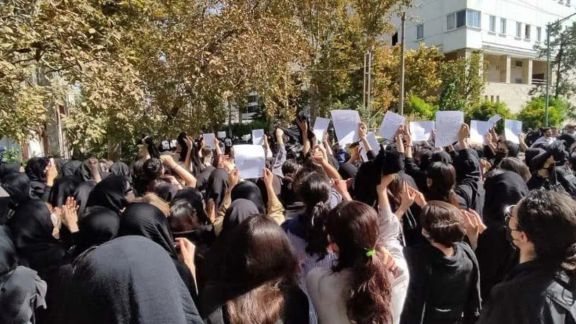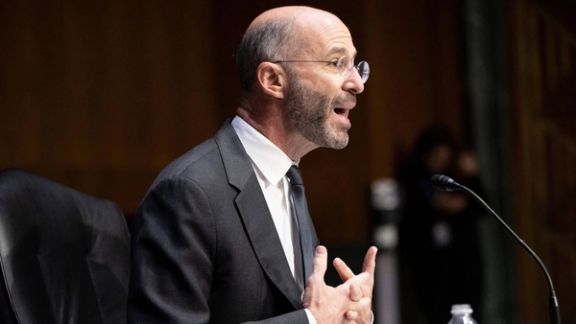Dissident Iranian Rapper's Life At Risk In Prison

Iranian dissident rapper Toomaj Salehi's life is “at risk” in prison and he may be a “target for assassination”, according to his social media account.

Iranian dissident rapper Toomaj Salehi's life is “at risk” in prison and he may be a “target for assassination”, according to his social media account.
Salehi's official account on X reported on Friday afternoon that he is being kept in an area in Esfahan Prison where criminals, including those facing charges for dangerous crimes, are being held without following the principle of “segregation of criminals” by type of crime.
"Intentionally" and "with a prior conspiracy", physical clashes between inmates have occurred in the past few days, the social media account reported. A tense and stressful environment has been created to subject Toomaj to psychological torture and possibly murder plans, the account added.
Salehi, 33, was rearrested on November 30 less than two weeks after he was released on bail following his detention for supporting the nationwide protests last year. It was reported that the recent arrest had involved severe physical abuse, with officers purportedly using pistols and AK-47 rifles butts.
According to Mizanonline, an a website affiliated with Iran's notorious Judiciary, Salehi was rearrested for “spreading lies and the agitating public opinion.”
Salehi gained fame for his protest songs which addressed social issues and government injustices in Iran. His initial arrest, which involved more than a year of incarceration, including 252 days in solitary confinement, was part of a wider crackdown on political opponents following Mahsa Amini's death in morality police custody.
In October Toomaj Salehi was awarded the 2023 Arts Freedom of Expression Award by Index on Censorship, an organization promoting free expression.

In Student Day statements, Iranian student groups have criticized the government for suppressive methods in universities and vowed not to give up their fight for freedom.
Describing the present time as "one of the most suffocating eras for universities in Iranian history," a group of students from Tarbiat Modarres University, a graduate school based in Tehran, emphasized that despite their university being traditionally associated with the education of higher officials and managers of the Islamic regime, its students actively participated in the Woman, Life, Freedom movement.
As a result of their involvement, the students stated that intelligence and security forces have intensified efforts to intimidate and eliminate nonconformist students and professors at their university.
Student Day, which usually falls on December 7, marks the anniversary of a student protest in 1953 against the visit of then-US Vice President Richard Nixon during which three Tehran University students were killed by the police.
Hundreds of university students were arrested across Iran during the protests that followed the death of Mahsa (Jina) Amini in the custody of morality police in late September last year. For months students in various universities held protest rallies inside universities and in some instances, they were supported by their professors and other faculty members.
In the past year, intelligence and security forces have made every effort to bring students and universities, some of which were scenes of extensive protests for months during the Woman, Life, Freedom movement, under control. Students and professors are still called in by intelligence organs and interrogated and often forced to pledge that they will not participate in any protests.
Student sources say authorities have banned hundreds of students in different universities from studying this academic year for taking part in protests and expelled tens of professors for opposing the crackdown on students during anti-government protests.
The crackdown on universities after the Woman, Life, Freedom movement and the recent purge of academia seems even harsher than the Cultural Revolution in the early 1980s, Mahdieh Golrou, a former student activist told Iran International TV.
In 1980, soon after the victory of the Islamic Revolution, the new government’s Cultural Revolutionary Headquarters shut down universities for three years to purge the academia of what it saw as secular professors, who could potentially challenge the clerical ideology. The new regime wanted to enforce its own Islamic revolutionary ideology (Islamification) in higher education establishments. During this period, thousands of professors and students were purged for various reasons, including political inclinations and western influences.
Students of Tarbiat Modarres University said in their statement that they would not leave and surrender their university to totalitarians. “We will fight for the smallest of opportunities to breath and to resist and use them against Islamic totalitarians to reach a humane, free and equal society,” they added.
Student groups in other universities have issued similar statements.
Iran's supreme leader, Ali Khamenei, usually meets with students on Student Day and delivers a speech but this year no meeting or speech was reported.
Some other officials -- including President Ebrahim Raisi, Parliament Speaker Mohammad-Bagher Ghalibaf, and Chief Justice Gholamhossein Mohseni-Ejei -- visited universities and met with pro-government students, not on Student Day but up to three days earlier in ceremonies that appeared to be very low-key in comparison with previous years.

The family of Mahsa Amini, set to receive the Sakharov Prize from the European Union, were not allowed to leave Iran for France for the award ceremony.
Mahsa Amini, a 22-year-old woman, was apprehended by Iran's morality or hijab police on the street in mid-September 2022. Within hours, she was transported to the hospital with critical head injuries, ultimately succumbing to the trauma three days later. The incident swiftly ignited widespread protests across the nation.
Mahsa Amini's father, mother, and brother were informed at Imam Khomeini Airport that they were prohibited from leaving the country, and their passports were confiscated.
The European Union had announced on October 19 that Mahsa Amini, along with the Women, Life, Freedom movement, would be honored with the prestigious Sakharov Prize.
The Amini family has been under intense pressures from security forces since Mahsa's death. similar to intimidation and gag orders enforced by Iranian intelligence against other families whose young members were killed by the government.
On the anniversary of Amini's killing, her father was temporarily detained on September 16 by security forces for intimidation purposes. Following threats and warnings, he was eventually released. Reports from social media and local Kurdish sources suggested that Amjad Amini, Mahsa's father, faced restrictions on leaving his house for a certain period.
Amjad Amini and his wife, Mojgan Eftekhari, had earlier called for a gathering to commemorate the anniversary of Mahsa’s death at her gravesite in a cemetery in Saqqez, west of Iran.
Iran International received information that Amjad Amini was summoned multiple times by the Saqqez Intelligence Office after announcing the ceremony marking his daughter's death, undergoing hours of interrogation.

A US lawmaker has requested easier access to information concerning the suspensions of officers in the executive branch, including former Iran envoy Robert Malley.
Malley was quietly removed from his duties in April as first reported by Iran International, apparently for mishandling restricted information, but the Biden administration has so far refused to disclose any details.
Republican Congresswoman Claudia Tenney introduced the ROBERT MALLEY Act on Thursday, which requires "the heads of executive agencies to disclose, upon request, relevant information to congressional committees regarding the furlough or indefinite suspension of employees."
Malley served as the Biden administration's special envoy for Iran until late April 2023, when he had his security clearance suspended and was placed on unpaid leave without explanation. Iran International first raised the issue of his long-term absence in June.
In September, Iran International and Semafor exposed a large Iranian influence operation in Washington.
The reports revealed that former Iran envoy Robert Malley's associates published op-eds, appeared on news channels, and even sought approval for their public appearances to promote the Islamic Republic's nuclear program.
In October, the US House Oversight Committee announced that it intended to subpoena Robert Malley as part of its investigation of US policies towards Iran.
The committee alleges that the government has obstructed Congress' repeated attempts to determine the reasons behind the revocation of Malley's security clearance by US Diplomatic Security two months before he was placed on unpaid leave.
Additionally, the committee is seeking records relating to one of Malley's aides, Ariane Tabatabai, and her involvement in the Iran Experts Initiative, a program intended to promote Iran's perspectives on nuclear negotiations.

Johan Floderus, a 33-year-old Swedish citizen and EU diplomat, has been held captive in Iran for the past 18 months, prompting his family to speak out about the severe conditions he faces.
With no routine consular visits or phone calls during his 600 days of detention in Tehran's Evin prison, Johan has resorted to hunger strikes at least five times, as revealed by his father, Matts Floderus.
Matts detailed the dire circumstances Johan is enduring in an interview with The Guardian. According to him, Johan is confined to a cell without a bed and compelled to sleep under constant lighting. Routine access to phone calls, books, and essential food supplements has been consistently denied.
Expressing the family's distress, Matts shared his wife's hope for Johan's release in time for Christmas, highlighting the devastating impact of the situation on their lives. He emphasized Johan's arbitrary detention, stating that he has committed no wrongdoing and should be released to leave the country.
He said the Iranians had “taken Johan for no reason” and “should ensure he has full human rights while there and they should release him and let him leave the country right away”.
Iran routinely arrests foreigners and dual citizens to use them as bargaining chips against Western countries. The United States released $6 billion of Iran's blocked funds this year to free five hostages.
Johan, an alumnus of Oxford, previously worked on the Afghanistan desk of the EU’s external services department. He was detained on April 17, 2022, in what seems to be a deliberate strategy by Iranian authorities, possibly aimed at leveraging his release against Iranian prisoners in the West or extracting financial concessions.
Johan's family awaits an imminent court hearing in December to learn of the charges against him.

Iran-backed militias in Iraq and Syria launched 10 fresh attacks on US targets Friday, as Tehran uses its proxies in the region to pressure Washington.
The militias have carried out more than 80 such attacks since mid-October, when Israel’s onslaught on Gaza began. But the Biden administration has largely avoided retaliation, drawing stark criticism from Congressional Republicans.
“How many attacks on American personnel and facilities by Iranian-backed militias in Iraq and Syria will be tolerated before we hold Iran accountable,” Senator Lindsey Graham asked on his X account.
“We have lost all deterrence as a nation,” he said. “The Biden Administration is letting our men and women in uniform down and putting them at risk by not challenging Iran directly.”
The Biden administration has been trying to avoid conflict with Iran ever since Hamas forces attacked Israel, fearing that the war on Gaza could expand and set the whole region ablaze.
Secretary of defense Lloyd Austin spoke Friday with the Iraqi Prime Minister Mohammed Shia al-Sudani reminding him of Iraq's obligation to protest diplomatic missions and "Coalition advisers and facilities." He emphasized that the US reserved the right to self-defense.
The attacks Friday were a mix of drones and missiles, targeting American bases and the US embassy in Baghdad –a first since October, marking a clear escalation of operations by Iran proxies in Iraq and Syria, who seem to have taken over from Houthis in Yemen.
The Houthis robbed the spotlight last week with several attacks on commercial vessels in the Red Sea and forcing two US warships to engage.
A senior White House official blamed Iran’s Revolutionary Guards (IRGC) for Houthi actions.
"We believe that they are involved in the conduct of these attacks, the planning of them, the execution of them, the authorization of them and ultimately they support them," deputy national security adviser Jon Finer said.
He added that the Biden administration has “not ruled out the possibility of taking military action” against the Houthis.
On Friday, Bloomberg reported that the administration “has been consulting with Gulf allies about potential military action” against Houthis.
The report suggested that the talks were at a “preliminary stage” and both the US and partners still favored diplomacy over direct confrontation, especially since any military action can jeopardize the renewed relationship between Iran and Saudi Arabia, which the Biden administration values as essential to the peace and stability in the region.
It seems unlikely, however, that the regime in Tehran or its regional proxies would change course unless they felt the heat.
“Retaliate yes and soon but the target must be something dear to Iran,” said Douglas London, a former CIA expert and a non-resident scholar at the Middle East Institute’s Countering Terrorism & Extremism program. “Little value in hitting the Houthis or Iraqi proxies apart from capability reduction since their casualties are expendable to Iran.”
The hardliners in Iran –including the Supreme Leader Ali Khamenei himself –believe the recent events to be in line with their interests and their long-term vision for the region.
The ongoing attacks in Iraq, Syria, and the Red Sea are likely intended to push the Biden administration to call for a ceasefire in Gaza. But they may also be intended to wreak havoc in the region, shifting American public opinion and eventually forcing US troops out or at least diminishing their presence.
In all this, the confusion and the dithering of the Biden administration can play the role of an unintended catalyst.